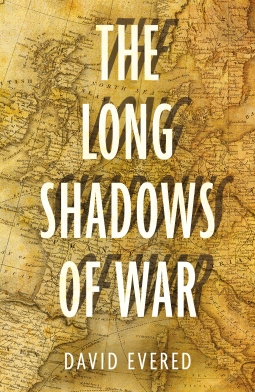
The Long Shadows of War
by David Evered
This title was previously available on NetGalley and is now archived.
Send NetGalley books directly to your Kindle or Kindle app
1
To read on a Kindle or Kindle app, please add kindle@netgalley.com as an approved email address to receive files in your Amazon account. Click here for step-by-step instructions.
2
Also find your Kindle email address within your Amazon account, and enter it here.
Pub Date Sep 28 2025 | Archive Date Sep 25 2025
Talking about this book? Use #TheLongShadowsofWar #NetGalley. More hashtag tips!
Description
Mark is a successful political journalist. Following the death of his emotionally constrained mother on the eve of the fall of the Berlin Wall, he finds a journal written by his father, George, who was absent throughout his childhood. It reveals the distinguished military record of a soldier charged with mine clearance in the ruins of post-war Germany.
George’s own words paint a vivid picture of the father Mark had scarcely known. A man dedicated to his family despite tensions in his marriage and his growing friendship with a local woman. He only becomes aware of the depth of his feelings for her as he is about to return home following demobilisation.
Mark had never challenged his mother’s account of his father’s death in 1947. He now sets out to dismantle the wall of silence she had erected and discover more. His sister discourages him sensing that disturbing family secrets might be uncovered, and his German born wife seeks to distance herself from his quest; she is scared that she will be forced to confront painful memories of her wartime flight from East Prussia and her post-war childhood.
Mark’s quest leads to a transformative conclusion in Germany against the background of the reunification ceremonies.
A Note From the Publisher
Available Editions
| EDITION | Ebook |
| ISBN | 9781836289166 |
| PRICE | £4.99 (GBP) |
| PAGES | 380 |
Available on NetGalley
Average rating from 3 members
Featured Reviews
 Paul W, Reviewer
Paul W, Reviewer
Of particular interest to me as a military dependent who logged time in postwar Germany with my Army officer father and took in with my own eyes evidence of the war’s devastation still evident eight years after its end was the picture of the war’s ruin rendered in David Evered’s “The Long Shadows of War.”
There’s this, for instance, from one of the German principals, Gisela, about the scenes she comes upon as she's fleeing the approaching Russians: “The destruction of Koln was as devastating as anything we had seen. … There were no untouched buildings; houses had been reduced to ruins, churches gutted and commercial premises were no more than shells. There was rubble everywhere.” And there’s this from another of the novel’s principals, George, an English soldier doing mine-clearing work, about a scene he comes upon: “Trees destroyed in the firestorm of battle remained, a forest of charred stumps silhouetted against an overcast sky. There were derelict trenches, decayed dugouts and countless rotting trolls of war.”
But finally it’s not so much the war's physical devastation as it is its lingering emotional toll that’s author Evered’s chief concern, with epigraphs from Eliot and Faulkner about the enduring legacy of the past opening the novel, when George’s son, Mark, and his sister, Martina, are going through their deceased mother's effects a half century later. The usual sorts of things they find, George’s educational attainments, his military records and his employment with the railroad, but not so usual, a couple of files with an accompanying instruction from their mother that they never be opened.
Intriguing enough the files are, particularly with the light they promise to shed on their mother’s enmity toward his father as well as the sparse detail she has always given about his accidental death, to make Mark very much want to disregard the instruction and read on, even as Martina and Gisela, to whom Mark is now married, resist, given their still-painful scars from that time, including Gisela having been assaulted and Martina having contracted polio.
On Mark presses, though, along with his son, to unravel the novel’s mysteries, which I won’t detail further so as not to spoil the book's surprises, which are abundant, other than to note that the novel’s larger treatment of the reunification of Germany, which is going on at the time, is deftly reflected in the family’s attempts to come to terms with its own divisions.
Not so deftly managed, though, to my mind, is the novel’s closing paragraph, which with its deliverance of the book’s final message, unfiltered through the book’s characters, is more characteristic of didactic nonfiction than of good fiction:
“War casts long shadows. Casualties occur even after the shooting has stopped. Absences and losses in the turmoil and chaos of war and its aftermath, particularly if unexplained, can generate uncertainties and ambiguities, conflicting passions and emotions leading to bitterness and rancour. Some wounds never heal, leaving indelible scars. There are countless unrecorded casualties of war.”
The impact of the division of Berlin on a family is cleverly captured in this book, which also analyses the wider impacts of the split. I enjoyed the mix of fact and story telling, feeling that I learned a lot more “inside information” about what it must have been like to live through the period.



